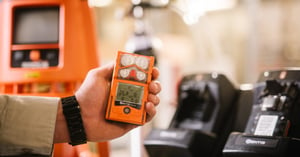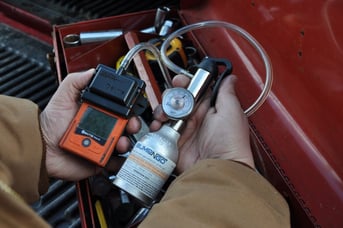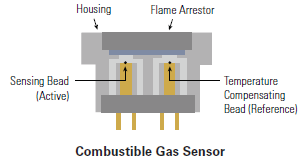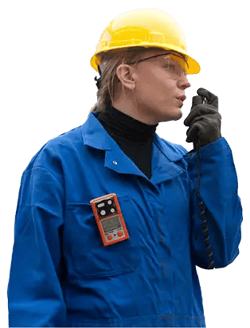When building a gas detection program for your facility, you've likely considered both fixed gas detectors and personal gas detectors. When should you use personal gas detectors vs. fixed gas detection devices? Will using portable gas detectors be sufficient, or are there scenarios where fixed heads are required (e.g. at vent points, etc.)?

This question is common—and for good reason: there really is no right answer here.
I am of the opinion that you should never forego using a personal monitor because you have a fixed detector in place in an area.
Personal portable gas monitors and fixed gas monitors are typically used for different purposes. Fixed monitors are generally used primarily to protect a facility, to detect catastrophic leaks, or to be an early warning of gases leaking from a system. Personal monitors are designed to protect personnel who may be working in a given area.
Fixed or portable, all of these devices are point detectors — they will only detect gas in direct contact with the sensors. People are portable, meaning that they move in and about any given area. With that said, a fixed detector, which will only detect gases that diffuse into it, can't completely cover the leak potential in any given area. This makes it very likely that a leaking gas and a worker could both move into an area that is uncovered by a fixed detector, thus putting workers at risk. Therefore, I don’t ever believe that a fixed detector can be a hands-down choice over a personal gas monitor.
The second issue is that fixed gas detection systems generally lack the routine and preventive maintenance that should be performed on them. I have seen far too many instances of unmaintained fixed gas detection systems that simply did not work and no one was the wiser. Unfortunately, there really is no way to know that a fixed gas detection system is working properly before you send workers into a given area. Whether your gas detectors are portable or fixed, it doesn’t matter—the only way you can be certain that a gas detector will detect gas is to test it with gas.
Don’t get me wrong. I am not saying that fixed gas detection systems don’t play a big role in safety. Fixed gas detection systems are often required to protect facilities by the insurance companies who are underwriting them and even by some standard electric codes. By protecting the facility, they are also protecting the lives of the people working in the facility. A fixed gas detection system can provide an early warning of hazardous gas before a worker steps foot in a given area. But if I am betting my life on a gas detector doing its job and properly protecting my life, I am going with a personal portable gas monitor every time.



